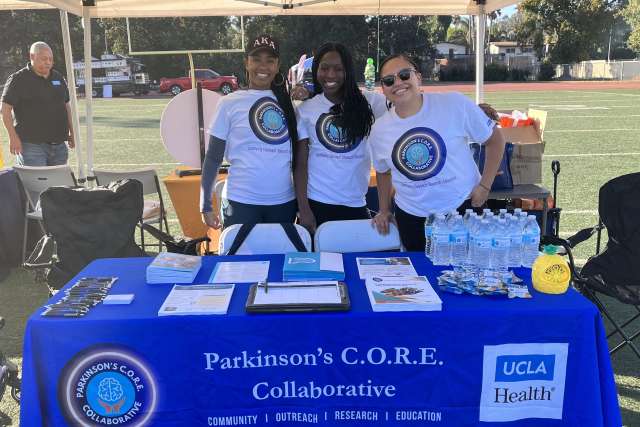Black Americans make up 13.6% of the U.S. population. Yet only 1.7% of participants in Parkinson’s disease (PD) trials are Black.
“That’s a staggeringly small number,” says Jennifer Adrissi, MD, an assistant professor-in-residence of neurology at the David Geffen School of Medicine at UCLA. “Black people with PD are not only underrepresented in clinical trials – they are also more likely to be diagnosed at a later stage, and less likely to receive appropriate treatment.
“As a movement disorders neurologist, I know that this results in a lot of unnecessary suffering. My research is focused on trying to move the dial toward more equity in the field.”
Recently, Dr. Adrissi was selected through a competitive review process to receive a UCLA Faculty Career Development Award. This award will support the development of a novel assessment scale. It’s intended to help PD researchers evaluate and improve their recruitment of Black participants in clinical trials.
Overcoming barriers to participation
“Most PD researchers really want to recruit a diverse group of participants for their study, but many don’t know how,” Dr. Adrissi says.
When completed, the new assessment tool will target this problem. It will consist of several questions about factors that are known to influence the likelihood that a Black individual will sign up for a clinical trial.
For example, one question might ask where a study is conducted. If the answer is that it’s only offered at a single academic institution or large hospital, that response would be flagged as a potential barrier. Recommendations would be provided, such as expanding the study to more locations in community-based clinics or adding a virtual component, if possible.
Involving the community at every step
To develop the assessment tool, Dr. Adrissi is employing an innovative study design. It involves partnering with the community to learn more about PD and find solutions to disparities. “I always say that my approach is at the intersection of outreach and research,” Dr. Adrissi says.
The first step, now in progress, is to recruit an advisory council composed of:
- Black individuals living with PD
- Their family members or care partners
- Community leaders from the Black community of LA County
Once the council is formed, it will be consulted at every stage of the development process, from identifying the key barriers to assess, to designing and validating the tool itself. Dr. Adrissi estimates that the entire process will take about a year and a half.
“Sometimes we develop things inside our academic bubbles, and then they don’t work very well in real life,” Dr. Adrissi says. “I think that partnering with the community from the outset will make this research more meaningful and accurate.”
Lack of inclusivity in clinical trials isn’t a problem that’s limited only to members of the Black community or people living with PD. If the assessment tool proves to be useful, Dr. Adrissi says that it could potentially be adapted for use in other populations, such as Latinos, and with other health conditions, such as Alzheimer’s disease.




